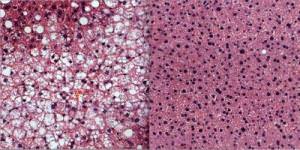Calorie-Restricted Diet Keeps Heart Young
People who restrict their caloric intake in an effort to live longer have hearts that function more like those in people who are 20 years younger. Researchers at Washington University School of Medicine in St. Louis have found that a key measure of the heart's ability to adapt to physical activity, stress, sleep and other factors that influence the rate at which the heart pumps blood, doesn't decline nearly as rapidly in people who have significantly restricted their caloric intake for an average of seven years.
Complex World Of Gut Microbes Fine-Tune Body Weight
Microorganisms in the human gastrointestinal tract form an intricate, living fabric made up of some 500 to 1000 distinct bacterial species, (in addition to other microbes). Recently, researchers have begun to untangle the subtle role these diverse life forms play in maintaining health and regulating weight.
Extended Fasting Overrides Harmful Effects Of A High-Fat Diet
It turns out that when we eat may be as important as what we eat. Scientists at the Salk Institute for Biological Studies have found that regular eating times and extending the daily fasting period may override the adverse health effects of a high-fat diet and prevent obesity, diabetes and liver disease in mice.
Drink Water To Curb Weight Gain? Clinical Trial Confirms Effectiveness
Has the long-sought magic potion in society's "battle with the bulge" finally arrived? An appetite-control agent that requires no prescription, has no common side effects, and costs almost nothing? Scientists report results of a new clinical trial confirming that just two 8-ounce glasses of the stuff, taken before meals, enables people to shed pounds. The weight-loss elixir, they told the 240th National Meeting of the American Chemical Society (ACS), is ordinary water.
Overweight? New Research Explains How Proper Sleep Is Important for Healthy...
If you're counting calories to lose weight, that may be only part of the weight loss equation says a new research report published online in The FASEB Journal. In the report, French scientists show that impairments to a gene known to be responsible for our internal body clocks, called "Rev-Erb alpha," leads to excessive weight gain and related health problems.
Brain Scans Can Predict Weight Gain And Sexual Activity, Research Shows
At a time when obesity has become epidemic in American society, Dartmouth scientists have found that functional magnetic resonance imaging (fMRI) brain scans may be able to predict weight gain. In a study published April 18, 2012, in The Journal of Neuroscience, the researchers demonstrated a connection between fMRI brain responses to appetite-driven cues and future behavior.
Potential Method To Control Obesity: Red Wine, Fruit Compound Could Help...
A compound found in red wine, grapes and other fruits, and similar in structure to resveratrol, is able to block cellular processes that allow fat cells to develop, opening a door to a potential method to control obesity, according to a Purdue University study.
New Evidence On Effects Of Green Coffee Beans In Weight Loss
Scientists have just reported striking new evidence that green, or unroasted, coffee beans can produce a substantial decrease in body weight in a relatively short period of time. In a study presented at the 243rd National Meeting & Exposition of the American Chemical Society (ACS), the world's largest scientific society, Joe Vinson, Ph.D., and colleagues described how a group of overweight or obese people who consumed a fraction of an ounce of ground green coffee beans each day lost about 10 percent of their body weight.
Regular Chocolate Eaters Are Thinner, Evidence Suggests
Katherine Hepburn famously said of her slim physique: "What you see before you is the result of a lifetime of chocolate." New evidence suggests she may have been right. Beatrice Golomb, MD, PhD, associate professor in the Department of Medicine at the University of California, San Diego, and colleagues present new findings that may overturn the major objection to regular chocolate consumption: that it makes people fat.
Aging, Overweight People Stay Happy Says New Study
Growing older and being overweight are not necessarily associated with a decrease in mental well-being, according to a cross-cultural study looking at quality of life and health status in the US and the UK.The study, led by Warwick Medical School at the University of Warwick, analysed lifestyle and health patterns in more than 10,000 people in both countries and their links to participants' mental and physical quality of life and health status.
Is Fructose Being Blamed Unfairly For Obesity Epidemic?
Is fructose being unfairly blamed for the obesity epidemic? Or do we just eat and drink too many calories? Researchers from St. Michael's Hospital reviewed more than 40 published studies on whether the fructose molecule itself causes weight gain.
Overeating May Double Risk Of Memory Loss
New research suggests that consuming between 2,100 and 6,000 calories per day may double the risk of memory loss, or mild cognitive impairment (MCI), among people age 70 and older.The study was just released and will be presented at the American Academy of Neurology's 64th Annual Meeting in New Orleans April 21 to April 28, 2012. MCI is the stage between normal memory loss that comes with aging and early Alzheimer's disease.





















